No, hummingbirds do not eat bees; they primarily consume nectar from flowers. While they do eat insects for protein, bees are not a regular part of their diet. Bees’ potential to sting and their harder exoskeleton makes them less attractive prey for hummingbirds.
Instead, hummingbirds opt for softer, smaller insects and spiders to supplement their nutritional needs.
Even though bees might look like a good source of nutrition, hummingbirds don’t eat them. Here are the quick key takeaways of the blog post.
Related post to read about Hummingbird Diet and Nutrition.
Key Takeaways:
- Hummingbirds primarily feed on nectar, and while they consume insects for protein, bees are not a typical part of their diet.
- Some larger species of hummingbirds, like Rufous and Allen’s, might occasionally interact with bees, but it’s not common for them to prey on bees.
- Hives are a source of abundant protein, but hummingbirds don’t primarily target them for food.
- A few hummingbirds might show interest in bees, but such behaviour is not widespread among the species.
- Potential bee stings and the presence of toxins in bee venom pose risks, deterring hummingbirds from making bees a regular part of their diet.
Now, let’s get into more detail about why hummingbirds do not like eating bees.
Related post to read about Best Hummingbird Feeders.
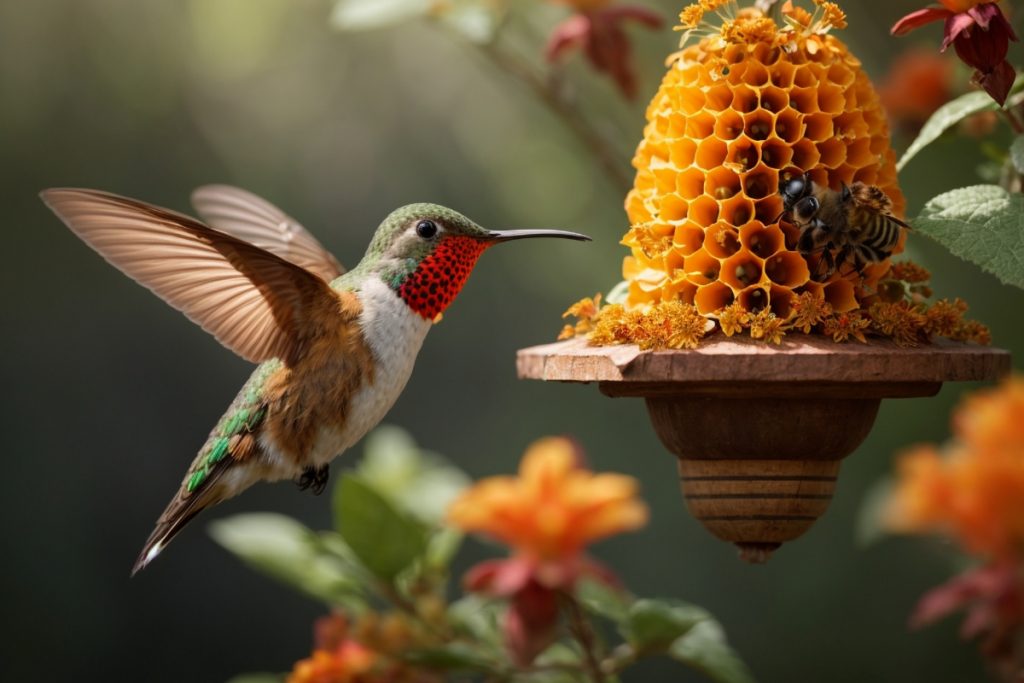
Why Do Hummingbirds Avoid Eating Bees?
While bees offer some nutritional benefits, they also pose challenges for hummingbirds. Here are the main factors limiting hummingbirds from eating bees:
- Stinging defences: Bees aggressively protect hives from predators. Stings can be deadly.
- Hard shells: Crunchy exoskeletons are harder to digest compared to soft-bodied insects.
- Toxins: Bee venom contains harmful compounds that may sicken hummingbirds.
- Low catch rate: Bees are relatively fast and agile, making them harder to snatch mid-air.
- Abundant alternatives: Smaller gnats, aphids, and fruit flies abundant around flowers pose less risk.
- Limited intake: The maximal volume of insect prey a hummingbird can consume is restricted.
These dangers and difficulties of hunting bees explain why hummingbirds do not eat bees.
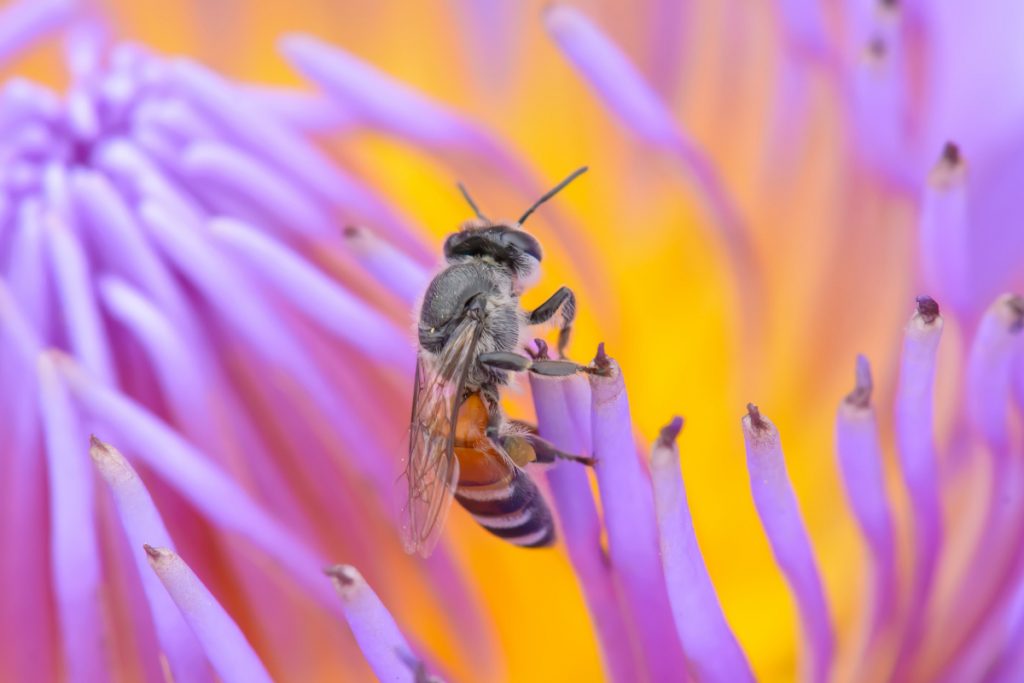
Why Do People Think Hummingbirds Eat Bees?
Here are some reasons to consider:
- Bees share a habitat, making predation plausible.
- Large hummers like Rufous exhibit predatory behaviour but towards other insects.
- Misinterpreting hummers inspecting hives as attempts to eat bees.
- Lack of awareness of hummingbirds favours easily digestible bugs, excluding bees.
However, even though there is no known evidence to prove that hummingbirds eat bees, some people still believe they do. Unfortunately, they do not consume bees.
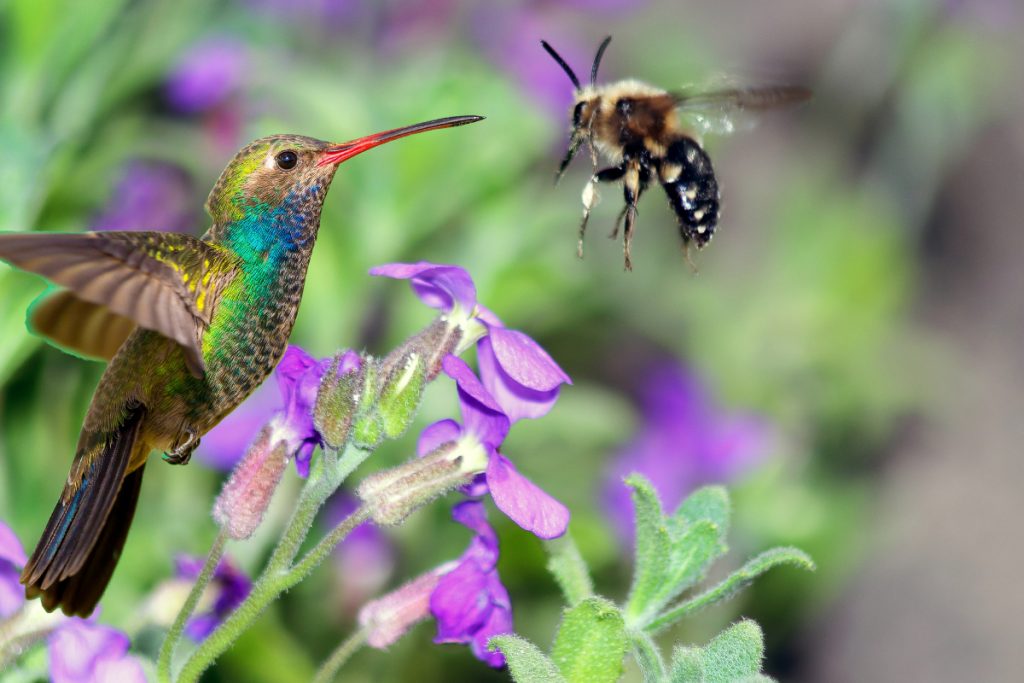
The Real Hummingbird Diet
To understand why they avoid bees, let’s look at what hummingbirds actually eat:
- Small insects like gnats, aphids, and flies from flowers they pollinate.
- Soft larvae and spiders, easy to swallow and digest.
- More insects when needing extra calories or feeding young.
- Tree sap for carbohydrates before flowers bloom.
Hummers prefer easily obtained, nutrient-dense foods that pose no harm. The dangers of bee hives explain their absence from their diet.
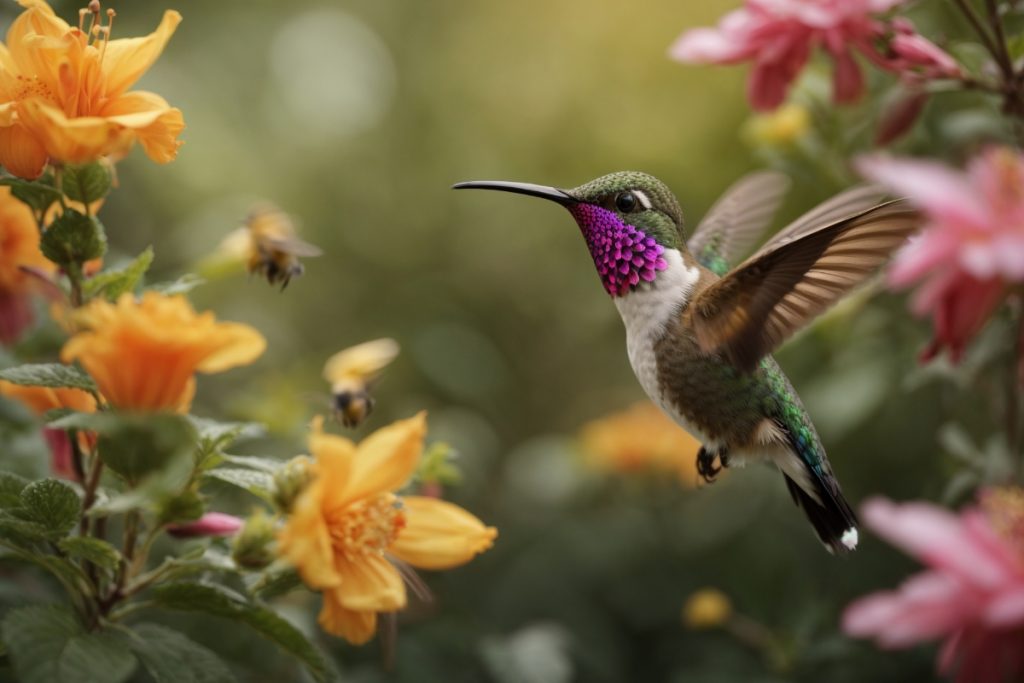
Final Thought
While hummingbirds do not eat bees, they are clever and resourceful in using hives to their advantage.
It’s amazing to see a hummingbird near a bee. Nature is full of cool things we have yet to see. Every time we see something new, we learn how everything in nature is connected.
As always, let me know your thoughts on this. I would love to read about your encounters with hummingbirds and bees!
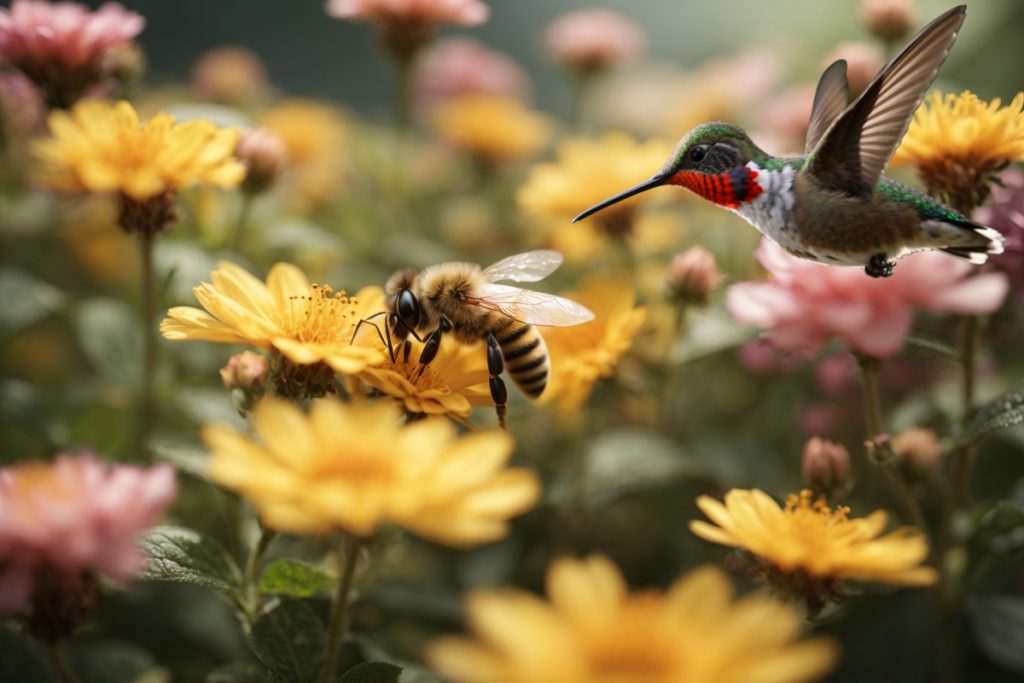
Frequently Asked Questions (FAQs)
Q: What are the primary food sources for hummingbirds?
A: Hummingbirds primarily feed on sweet nectar from flowers and small insects. They also enjoy sugary solutions from hummingbird feeders.
Q: How can I keep bees and other unwanted insects away from hummingbird feeders?
A: Use bee guards on feeder ports and apply petroleum jelly around them. Regularly clean your feeder and ensure there are no leaks.
Q: Do yellow jackets pose a threat to hummingbirds at feeders?
A: Yes, yellow jackets can compete with hummingbirds for nectar and may pose a danger to the birds.
Q: Will planting a pollinator garden attract more bees than hummingbirds?
A: Nectar-rich flowers will draw both bees and hummingbirds. However, red tubular flowers are particularly appealing to hummingbirds.
Q: How can I make my pollinator garden attractive to hummingbirds?
A: Plant a mix of nectar-rich flowers, especially bee balm, to lure hummingbirds. Flower colours and designs also play a role.
Q: Why are bees attracted to hummingbird feeders?
A: Bees are drawn to sugary foods, and the nectar in hummingbird feeders serves as their food source.
Q: Is it harmful to have bees around hummingbird feeding stations?
A: Bees can dominate a feeder, preventing hummingbirds from accessing the nectar and causing potential conflicts.
Q: Are saucer feeders better than inverted hummingbird feeders for preventing bees?
A: Saucer feeders deter bees more effectively because the nectar is less accessible.
Q: Do hummingbirds ever get stuck in flowers when moving from flower to flower?
A: Hummingbirds have specialised bills and tongues that let them efficiently access nectar without getting trapped in flowers.
Q: Can insects contaminate the sugar solution in hummingbird feeders?
A: Yes, insects can potentially introduce bacteria and mold to the sugary syrup, so it’s important to frequently clean hummingbird feeder ports.
Q: How often should I change the nectar in hummingbird feeders?
A: Change every 2-3 days in hot weather and every 5-6 days in cooler temperatures to ensure the sugar solution stays fresh for hummingbirds.
Q: What’s the best way to supplement my hummingbird’s diet?
A: Offer a variety of fresh flowers for natural nectar and incorporate insect-attracting plants to provide protein from gnats, aphids, and other small bugs.
Q: How can I keep hummingbird feeders safe from stinging insects like wasps and yellow jackets?
A: Choose feeder designs with integrated bee guards, routinely clean away insect nests, and apply a small amount of petroleum jelly on feeding ports.
Q: Do hummingbirds eat at bee feeders?
A: No, hummingbirds strictly consume nectar and insects, not the honey or pollen in bee feeders.
Q: Can ants damage hummingbird feeders?
A: Ants can contaminate the nectar and attract other pests. Coat feeder hanging wires with petroleum jelly to deter them.
Q: What are some good shady spots to hang hummingbird feeders?
A: Places under trees or porches are ideal, provided there’s enough sunlight to attract hummingbirds.
Q: How often should I clean my hummingbird feeder?
A: Clean every 2-4 days, more frequently in hot weather. Use a vinegar and water solution to safely and effectively remove mold, bacteria, and other potential contaminants from feeders. Never use bleach solutions, as the residual chemicals pose health risks to hummingbirds.
Q: What can attract bees besides hummingbird feeders?
A: Bees can be attracted to open compost piles, fallen fruit, overflowing trash cans, and pet food bowls left outside.
Q: Should I avoid wearing floral prints near hummingbird feeders?
A: No need to avoid floral prints, as hummingbirds are attracted to red feeders and nectar, not clothing prints.
Q: How can I identify beneficial insects in my yard to support hummingbirds’ food needs?
A: Learn about small insects like aphids and gnats that provide protein for hummingbirds. Avoid harming these beneficial insects.
Q: Why shouldn’t I add red dye to hummingbird nectar?
A: It offers no nutritional benefit and can be unhealthy for hummingbirds.
Q: How can I deter aggressive wasps from my hummingbird feeder?
A: Coating feeder ports with petroleum jelly or installing bee guards helps block unwanted insects like wasps without deterring hummingbirds from the nectar source.
Useful Links:
Related Posts to Read:
- Do Hummingbirds Beaks Open When Feeding?
- The Mysteries of Hummingbird Flight.
- 6 Fascinating Facts About Hummingbird Sizes.
- Ruby-Throated Hummingbird Migration Map.
- Where Do Hummingbirds Go When It Rains?
- How Much Does A Hummingbird Eat Per Day?
- Do Hummingbirds Eat Wasps?
References:
- About Hummingbird (Link).
- Greenewalt, C. H. (1960). Hummingbirds. New York: Doubleday. Google Scholar.
- Carey C. The impacts of climate change on the annual cycles of birds. Philos Trans R Soc Lond B Biol Sci. 2009 Nov 27; 364(1534):3321-30. doi: 10.1098/rstb.2009.0182. PMID: 19833644; PMCID: PMC2781852.
- Rico-Guevara A, Rubega MA, Hurme KJ, Dudley R. Shifting Paradigms in the Mechanics of Nectar Extraction and Hummingbird Bill Morphology. Integr Org Biol. 2019 Jan 2;1(1):oby006. doi: 10.1093/iob/oby006. PMID: 33791513; PMCID: PMC7671138.
- Tyrrell LP, Goller B, Moore BA, Altshuler DL, Fernández-Juricic E. The Orientation of Visual Space from the Perspective of Hummingbirds. Front Neurosci. 2018 Jan 30;12:16. doi: 10.3389/fnins.2018.00016. PMID: 29440985; PMCID: PMC5797624.
- Hummingbirds Sighting (Journey North Map).
- About Hummingbird’s Characteristics.
